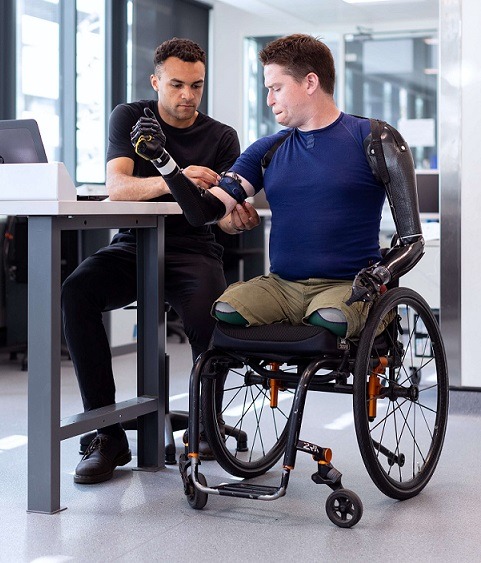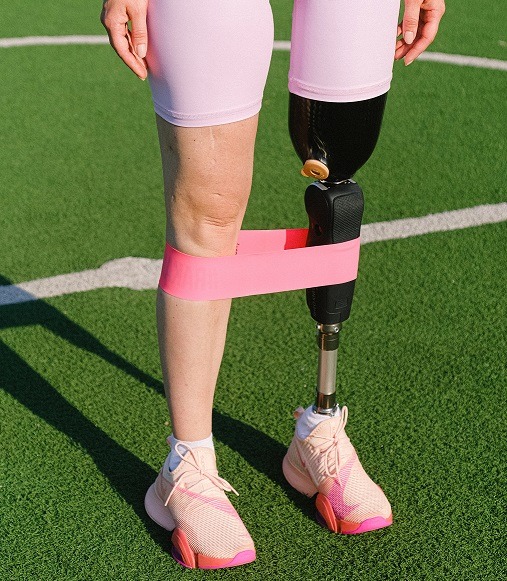Amputation Injury Lawyer
Our amputation injury attorney understands that when you lose a part of your body, you’re losing a piece of yourself. After an amputation, you never view yourself the same way again. It’s a catastrophe. Every time you look in the mirror or attempt to do something that you used to do without thinking, you see a reminder of yourself as you once were. You will be transformed for the rest of your life, both psychologically and physically.
The road to rehabilitation, which will inevitably be partial, is long and difficult. Typically, surgery is performed first to remove the injured section of your body (or repair the wound if the accident itself resulted in a complete amputation). The actual and difficult job of learning to live without the missing bodily part comes once you have adequately healed from the operation. You will most likely be supplied with a prosthesis and will require significant physical therapy to learn how to move and function with the new part. This may be excruciatingly uncomfortable, sluggish, and unpleasant, not to mention costly. You will most likely be out of work for some time, depending on the area of your body involved.

Causes of Most Amputation Injuries
Many injuries that end in amputation are avoidable. They are accidents caused by human mistakes, such as texting while driving, producing defective consumer goods, and neglecting to adequately equip personnel for risky occupations. These are some of the sorts of injuries that may lead to an amputation:
- Defective products
- Vehicle rollovers
- Tire blowouts
- Explosions and fires
- Motorcycle accidents
- Accidents involving cars and trucks
- Pedestrian and bicycle collisions with motor vehicles
- Accidents at work, particularly in the construction industry
We can identify the defendant after we know how your amputation injury occurred. This is the party we feel is to blame for your injuries — the party we will designate as the at-fault party in your injury action. Depending on the facts, many defendants may be at fault for your amputation injury. We can assist you in identifying the defendant in your amputation lawsuit.
Amputations of Different Types
Traumatic amputation can be partial (the limb is only partially linked to the body) or total. When a limb is completely severed from the body, it is said to be amputated. Amputations are frequently categorized based on the method of damage.
Avulsion Amputation: Avulsion amputations occur when a limb is removed by violent overstretching. This sort of amputation is typical in heavy machinery accidents when a limb becomes entangled in a moving piece of machinery. Because of the degree of damage caused, reattaching a limb following an avulsion amputation can be extremely difficult.
Crush Amputation: A crush amputation occurs when a large item falls on or is pushed against a limb. Amputations of this sort are prevalent in heavy machinery accidents. Because of the considerable damage to the muscles and bones, reattaching a limb following a crush amputation can be challenging.
Sharp amputation: Sharp amputations occur when an accident makes a “clean-cut,” which means the damage has well-defined edges and may make reattaching the leg simpler.

The Effects of Amputations
The loss of a limb is terrible on its own. However, when that loss is combined with the unfathomable cost of the victim’s sorrow, as well as missed pay, persistent physical and mental handicap, medical bills, and a changed sense of self, the cost of an amputation becomes tremendous. Even when a victim has the requisite financial resources, limb loss can cost tens of thousands of dollars only to obtain, not including the arduous physical treatment and lengthy learning process required to use such devices or the lost job productivity of amputees post-recovery.
Amputation has the following consequences:
- Decreased mobility and dexterity
- Stump and phantom limb discomfort
- Infection
- Tiredness or fatigue
- Deep vein thrombosis (DVT)
- Problems with body image
- Isolation from others
- Depression
- Anxiety
- Denial (refusal of steps such as physiotherapy necessary for adapting to life with an amputation)
- Grief
- Suicidal thoughts
Money for an Amputation Injury Lawsuit
If you have lost a physical body part due to someone else’s carelessness or crime, the law permits you to file a claim for financial compensation from the person who caused your amputation. Obtaining this money can make a world of difference in your recovery since it will allow you to receive cutting-edge medical care, rehabilitation, and prosthetic equipment, as well as psychological counseling to help you adjust to life without a limb or a finger. It will also assist you and your family in replacing the money you have lost – and may continue to lose – as a result of your inability to work. In a personal injury suit, you may be eligible for many types of damages.
- Medical and health-care costs from the past and the future
- Expenses and accommodations for disabled people
- Past salaries and benefits
- You have lost potential earning capacity as a result of your impairment.
- Emotional agony.
- Loss of companionship
- Domestic services that are lost.
- Out-of-pocket costs
Amputations are frequently complex and challenging matters that need professional legal assistance. Amputation is a severe injury. You should never try to negotiate a settlement with the insurance company of the liable party on your own. Insurance adjusters are well-trained in a variety of strategies for denying or reducing the amount of your claim. The insurer’s purpose is to pay out the smallest amount possible on every claim, and the company’s best interests are diametrically opposed to yours. A skilled personal injury attorney understands how to counteract insurance company practices in order to win justice and fair payment for you. Just be certain that the attorney you select is highly skilled and has years of expertise in this field.

Will insurance pay for phantom leg syndrome?
Even after your body has recovered, you may endure acute and chronic agony in the severed part—despite the fact that it is no longer there! This is known as “phantom limb syndrome,” and it may be crippling. Then there’s the issue of how to cure pain in a bodily part that no longer exists!
There are no simple solutions to this issue, and you may need to try a variety of therapies until you discover one that works for you. Alternative therapy is often the most effective for amputees. However, insurance companies frequently refuse reimbursement for “out-of-the-box” therapies, even if they are the only thing that works! Here are some examples of therapies that may or may not benefit you.
- Acupuncture
- Augmented reality therapy
- Biofeedback
- Mirror box therapy
- Hypnosis
- Massage
- Chiropractic
- TENS (transcutaneous electrical nerve stimulation)
When one therapy is the only thing that works, having the money you’ve regained for your amputation lawsuit may be the only way for you to get the relief you need.
What are your results in amputation cases?
$2,200,000 Tire Sealant Explosion – Total Blindness & Partial Amputation of Hand
A retired Navy engineer was helping his neighbor fix a flat on his mobile home. The tire exploded, throwing the man back nearly eight feet and bending the tire’s rim in half. It blinded him and severed part of his hand. The manufacturer of the fix a flat made a non-explosive formula for the Canadian market but produced a dangerous formula for the United States market. Attorney David Willis brought a lawsuit against the canned tire inflator manufacturer and against the big box store that sold the product. In a deposition, the company’s president promised that the explosive formula would no longer be sold. This case was settled for $2,200,000. Expenses $29,433, Attorneys’ Fees $880,000, Net to Clients $1,290,567
Contact a Houston Amputation Lawyer
Our amputation attorney has handled dozens of lawsuits nationwide involving the loss of limbs or fingers. Attorney David P. Willis is board certified as a personal injury trial law specialist. We’ve put in a lot of effort to get the best results for our clients, and we’ll do the same for you and your loved ones. Call us at 713-654-4040 or 1-800-883-9858.
